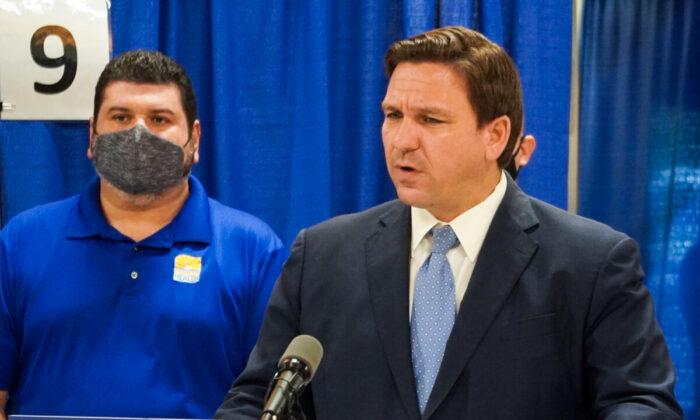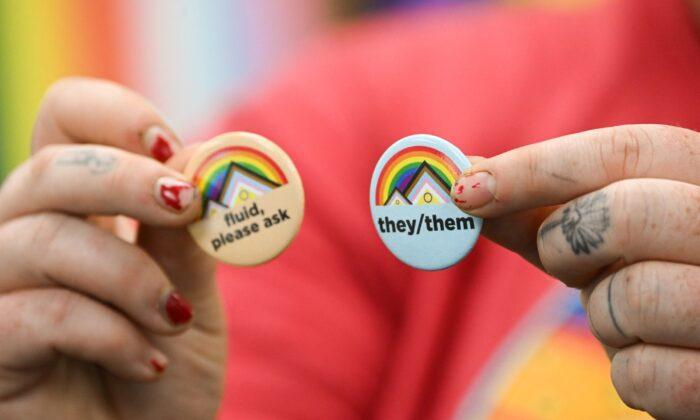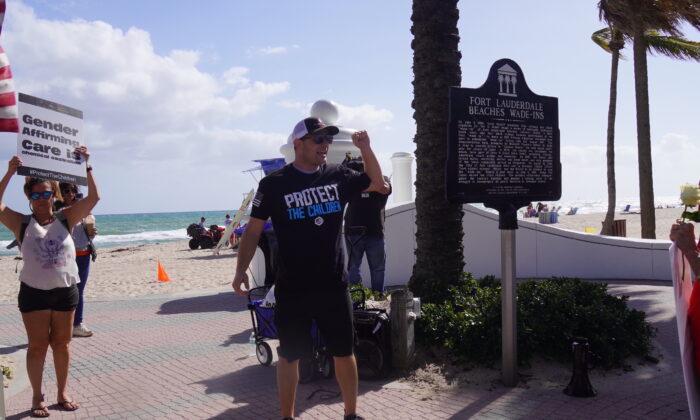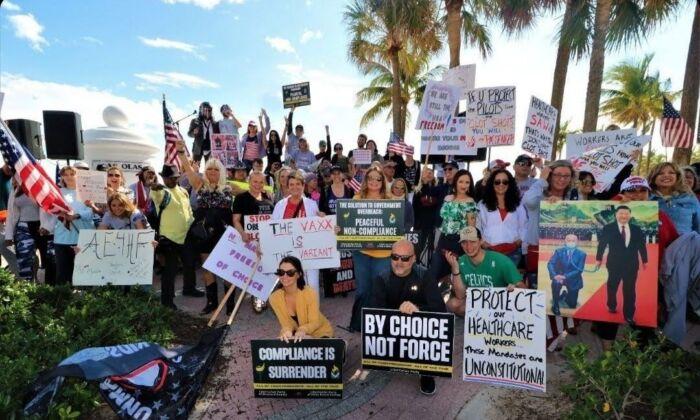PUNTA GORDA, Fla.—The state of Florida has administered more than 10,000 doses of the monoclonal antibodies treatment at state-sponsored sites since Florida began rolling out the program two weeks ago, the office of Gov. Ron DeSantis (R) told The Epoch Times.
Demand for the treatment is high and is expected to go higher as word gets out and new sites are continuing to open throughout the state, Christina Pushaw, the governor’s press secretary, said.
The 10,000 doses administered at state-sponsored sites do not include treatment administered at infusion centers at clinics and hospitals around the state.
Baptist Health South Florida’s Dr. Oscar Hernandez says he refers five to six patients for the treatment every day.
“The state is doing their part,” Hernandez said. “Doctors need to be more proactive in recommending the monoclonals to high-risk patients who test positive for COVID-19.”
He said people need to know their options after they test positive for COVID-19. He recommends a fact sheet be distributed to patients at drive-through testing sites.
Fauci Touts Effectiveness of Monoclonal Antibodies
Tuesday, the White House Chief Medical Adviser, Dr. Anthony Fauci touted the effectiveness of Monoclonal Antibodies. He estimated that the treatment could reduce hospitalization by up to 85 percent. Fauci encouraged anyone with suppressed immune systems as well as other mitigating factors take advantage of the treatment.“Bottom line is this is a very effective intervention for COVID-19. It is underutilized, and we recommend strongly that we utilize this to its fullest,” Fauci said at the press conference on Tuesday.
Flagler County Health Department Administrator, Bob Snyder received his COVID-19 vaccine in January 2021, but because of an underlying health condition contracted COVID-19 about six weeks ago.
Initially, he did not know what was wrong because the symptoms were so mild, he thought he was just “run down” from his busy work life.
“It was sunny and 95 degrees and I’m freezing,” Snyder said. “I thought to myself, I’ve got to go to bed.”
Snyder said it occurred to him that he may be one of the breakout cases he had read about and went to the local pharmacy and bought an in-home COVID-19 test. It was positive. That prompted Snyder to call a colleague who is a doctor. The doctor had two words for him: Monoclonal Antibodies.
Florida Resident Feels Blessed to Have Access to Treatment
Broward County resident Renee Post sends her 70-year-old mother to a skilled nursing facility during the day while she works. The facility tested residents for COVID-19 every 36 hours.“I was picking my mother up from the skilled nursing facility and they wouldn’t let us leave until after my mother tested negative for COVID,” Post said. “Then the nurse came running out to my car and told us we couldn’t leave because my mom had tested positive for COVID.”
Post said she recalled seeing a news report on the monoclonal antibodies and knew what she needed to do.
“I had her transported to Broward Health and they were well organized and took her right away and in two hours she walked out,” she said.
Post said that her mother had the “sniffles” the next day but otherwise you could not tell she had even been sick. Post said her mother is obese and suffers from a “myriad of health problems.”
“She would have been another statistic if I had not taken her and known about the monoclonals,” she said. “I feel so blessed to have had access to this treatment for her and I know if we had waited, we would’ve had a different outcome.”
Post said her mother was unvaccinated because her mother had a urinary tract infection and other underlying conditions.
Post said she works primarily from home but has coworkers internationally who have been affected by the virus.
“I see what it [the virus] can do,” she said. “I have lost 22 co-workers in India.”
If she were to contract COVID-19, Post said she will seek the treatment for herself because she sees “what a miracle” the treatment is.
This week DeSantis is opening more treatment sites, including one at The Villages, a retirement community in central Florida.
Pushaw, the governor’s press secretary, said of the 10,000 treatment landmark: “If even 50 percent of those people were saved from needing hospitalization, that is 5,000 patients who would otherwise have been hospitalized—a huge number, almost a third of our total COVID hospital census... This rollout is definitely saving lives.”
The monoclonal antibodies can prevent hospitalization or death in high-risk patients with COVID-19 and is widely available in Florida. Individuals 12 years and older, who are high-risk and have contracted or been exposed to COVID-19, are eligible for this treatment. Treatment is free and vaccination status does not matter.
Similarly in Texas, Gov. Greg Abbott set up sites around the state beginning November 2020 and used Bamlanivimab, the Eli Lilly & Company monoclonal antibody therapy. It was the first to garner FDA approval followed by Regeneron.
When former President Donald Trump made a full recovery from COVID-19 after using monoclonals, he instructed the federal government to buy hundreds of thousands of doses of the two monoclonal treatment drugs and allocate supplies to the states, which would in turn determine distribution to hospitals and healthcare facilities. The doses were allocated to states and U.S. territories based on their share of hospitalized and infected patients.





Friends Read Free